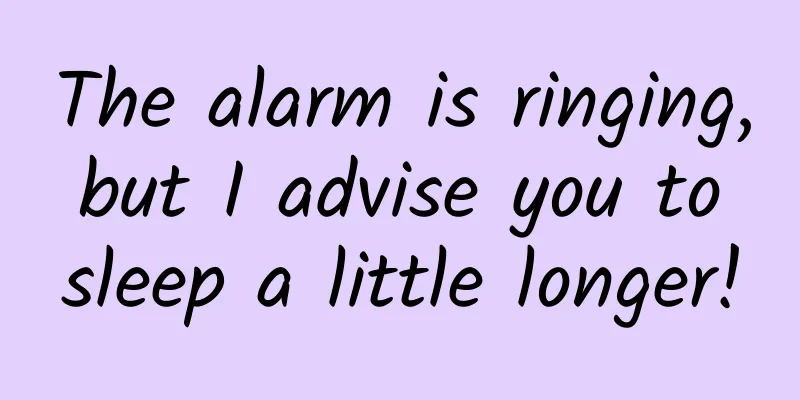The alarm is ringing, but I advise you to sleep a little longer!

|
Is this how you get up every morning? Seven or eight alarm clocks can't wake you up, and the alarm clock has become a way for you to change your sleeping position and continue sleeping. Image source: Internet And a warning of being late for work (again). How can I wake up as soon as the alarm rings? Get up when the alarm goes off It's really anti-human. If you’re like me and can’t wake up to your alarm every morning, don’t worry because it’s almost our nature. A survey in 2017 found that staying in bed late is much more common than we thought. Nearly 70% of young people aged 20 to 29 cannot get up immediately after the alarm rings. A recent article published in the Journal of Sleep Research also reported that 69% of respondents would use the "snooze a little longer" function or set multiple alarms. But why can't we always get up? The researchers interviewed the participants and found that the most common reason was "unable to wake up/too tired." After all, going to work every day is exhausting, and you may have to work overtime or stay up late at night. Our bodies and brains have long been overloaded, and a few hours of sleep is not enough. The second reason is that it feels so good to lie in bed . Other common reasons include "worrying about not being able to wake up", "needing a longer sleep time", "no motivation to get up", and "lack of sleep". Image source: Literature So, it’s not your fault if you can’t get up. It’s normal to stay in bed in the morning. Sleep after the alarm goes off Better condition Not only that, the latest scientific research even finds that staying in bed for a while or taking a nap after the alarm goes off may be better for our health! A research team from Stockholm University in Sweden recruited a group of participants and divided them into two groups. One group was the "snooze group", in which they needed to set the first alarm 30 minutes before getting up, and then the alarm would ring every 9 to 10 minutes; the other group was the "direct wake-up group", in which the participants got up immediately after the alarm rang. The researchers unexpectedly discovered that taking a 30-minute nap after the alarm went off significantly improved cognitive abilities, including arithmetic speed, contextual memory, and cognitive control. Come to think of it, after all, most of my energy is spent on getting up every day, so how can I have the energy to care about memory and self-control? It’s good enough to be able to punch in on time! The nap group showed improvements in computational ability, contextual memory, and cognitive control within 40 minutes of waking up. Source: Reference [2] In addition, a nap can also increase morning cortisol levels, making you more alert and happier when you wake up. With a good mood, optimistic attitude, sharp cognitive thinking, and sufficient energy, I dare not imagine how much my work efficiency can be improved. In this regard, the researchers explained that this is because there is a transition period from sleep to wakefulness, which is called sleep inertia. During this period, people will experience temporary confusion, slow reaction, lack of concentration and memory decline, which will gradually dissipate as the wakefulness time increases. Research from neuroscience has also found that there are big differences in our neural activity when we are asleep and awake, so there may be delays when switching between states. From an evolutionary perspective, a certain period of sleep inertia allows us to fall asleep quickly when we wake up accidentally, helping us to better conserve our energy. A 30-minute nap in bed may help relieve sleep inertia and improve cognitive function after waking up. Sleep inertia (green line) occurs immediately after waking up and disappears after about half an hour. Source: Reference [4] In other words, our bodies also need a little buffer time. Taking a nap after the alarm rings can not only improve cognitive function and regulate cortisol levels, but also keep you in a better state and mood. No wonder our ancestors left us valuable old sayings: Sharpening the knife does not delay the chopping of wood, just wake up and go back to work! How to wake up painlessly So, what can we do to minimize the pain of getting up? According to experiments, we can set 3 to 4 alarm clocks to wake ourselves up gently. The first alarm should be as gentle as possible. It can be an iPhone's sleep alarm with a gradual volume and fresh and bright melody; it can be a smart watch that wakes you up with vibration on your wrist; it can also be the curtains that open automatically or prepare a natural wake-up light that simulates sunrise light. Image source: Internet Never use the iPhone ringtone radar. The sharp tone can wake people up, but you may also be scared into falling asleep. Then, set a gentle alarm every 9 to 10 minutes, and let yourself take three light naps before finally waking up, so as to reduce the discomfort caused by being awakened and make it easier for you to wake up. Of course, you have to get up from this bed. You can't take naps indefinitely. Remember to change the ringtone of the last alarm clock before getting up to an equally gentle one to tell yourself that it's really time to get up. If you are worried that the last alarm clock will not wake you up, you can give yourself some intensity at the end. For example, you can use an alarm clock carpet that weighs more than 15 kilograms and stand on it for 10 seconds before the alarm clock stops; or you can try a fancy waking up app, which requires you to take photos at a fixed point or do arithmetic problems to turn off the alarm clock. Image source: E-commerce comment area In short, taking a nap after the alarm goes off is actually a wise choice! Don't think you are wrong anymore, we are doing this to start the new day better~ References [1] Roitmann, E. (2017). To snooze or not to snooze: The truth about the snooze button. To Snooze or Not to Snooze: The Truth About the Snooze Button — WITHINGS BLOG [2] Sundelin, T., Landry, S., & Axelsson, J. (2023). Is snoozing losing? Why intermittent morning alarms are used and how they affect sleep, cognition, cortisol, and mood. Journal of Sleep Research, e14054. https://doi.org/10.1111/jsr.14054B3 [3] Stepanski, EJ (2002). The effect of sleep fragmentation on daytime function. The Effect of Sleep Fragmentation on Daytime Function, 25(3), 9–276. [4] Hilditch, CJ, & McHill, AW (2019). Sleep inertia: Current insights. Nature and Science of Sleep, 11, 155–165. Sleep inertia: current insights | NSS Planning and production Source: DingXiang Doctor (ID: DingXiangYiSheng) Author: Zheng Weiwei Review丨Yu Zhouwei, Chief Physician of Neurology at Almond Clinic Editor: Wang Mengru Proofread by Xu Lai and Lin Lin |
>>: Zhu Kezhen: The weather is always changing, but your heart remains unchanged
Recommend
Is the franchise fee of Tongliao Steel Mini Program high? Tongliao Steel Mini Program Franchise Fees and Process
How much does it cost to join the steel mini prog...
How does Baidu Direct charge per click?
The charges are based on clicks, and only valid c...
It looks beautiful but is actually dangerous. How was the name of the new coronavirus created?
Delta has not yet left, and a new variant of the ...
The coldest winter is coming? Are you freezing cold? Is La Nina to blame?
This article was first published by Hunzhi (WeCha...
Hu Q&A丨What does growing taller have to do with it?
"Hello, I am the editor of China Science Exp...
Inventory: Five regular and long-term side projects that can make money at home
Today’s content is a bit too much, the full text ...
OPPO Wi-Fi 6 Router AX5400 Review: Good-looking and powerful
With the development of smart homes, there are mo...
I didn’t expect that you are like this on World Toilet Day!
I am Dongdongmiao, World Toilet Day is so fun! In...
If you accidentally swallow gum, don’t worry, it will be fine in a week!
When I was a child, the two most common lies I he...
What is the operation direction and value of mobile game products?
Even without an operations team, the company can ...
Is a small screen a true flagship? Meizu PRO 6 unboxing photos
Meizu PRO 6 is undoubtedly a controversial flagsh...
Can all calculations be performed using only a piece of white paper?
Although many people regard origami as an interes...
Qoros Model Young SUV debuts at Guangzhou Auto Show: its last act before being abandoned by Chery?
At the 2017 Guangzhou Auto Show, Chery officially...
What? Edamame is soybean? Lentil stewed with noodles is actually green beans?
A few days ago, a heated debate broke out in the ...
If you do business well, girls won’t run away! 520 Guide to Getting Rid of Singleness, Take It, No Thanks!
Let me first share some data with you. The Nation...









